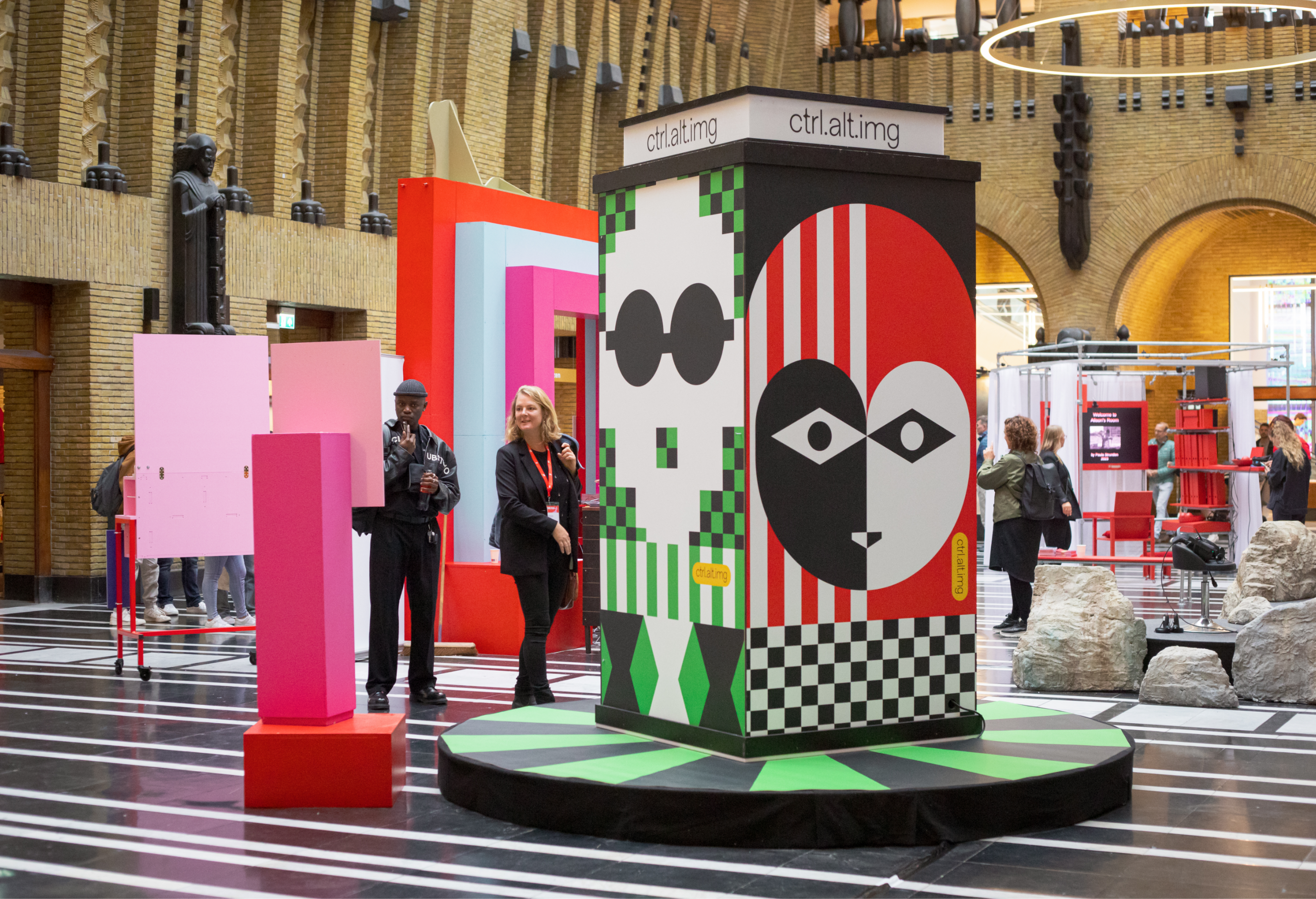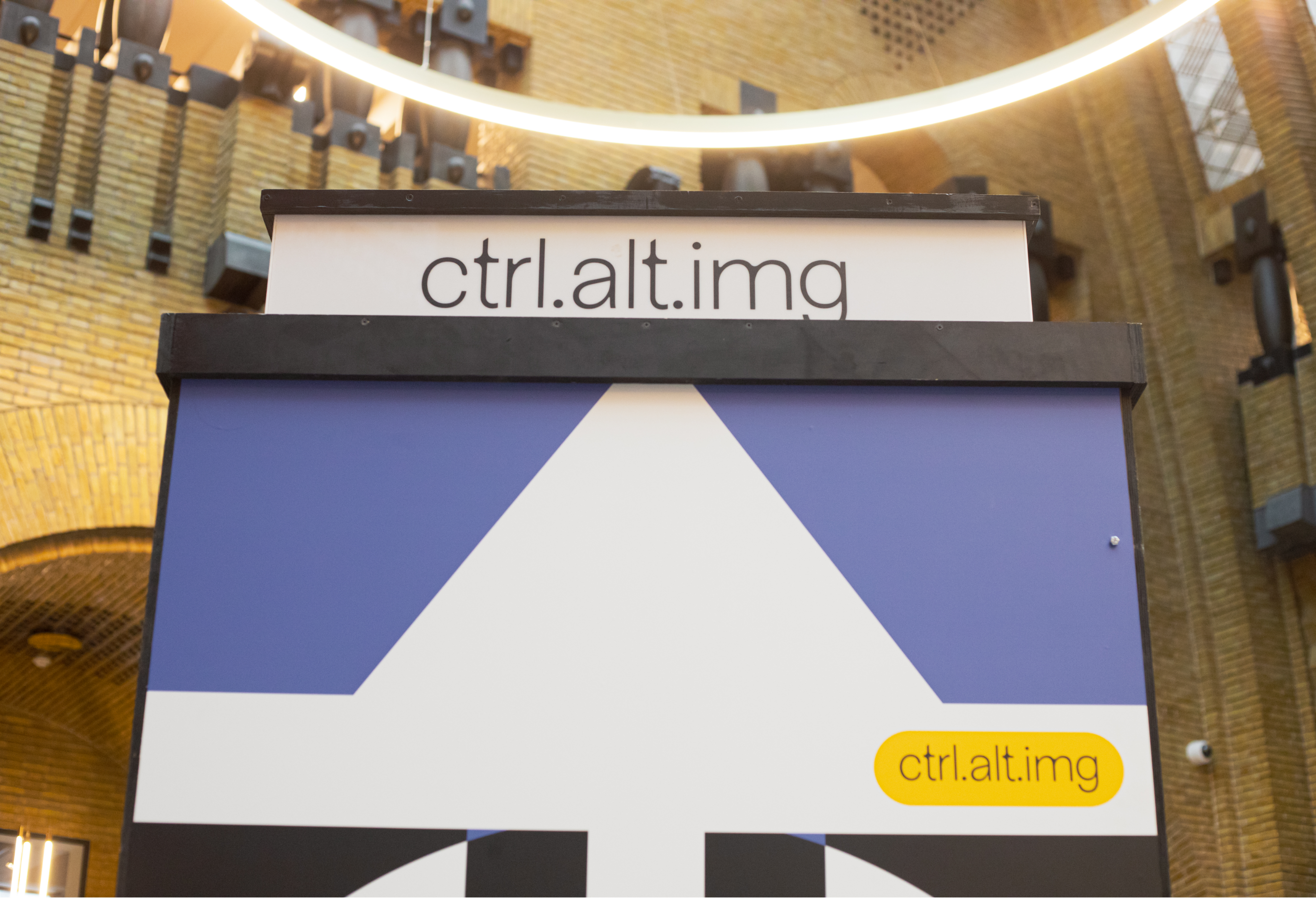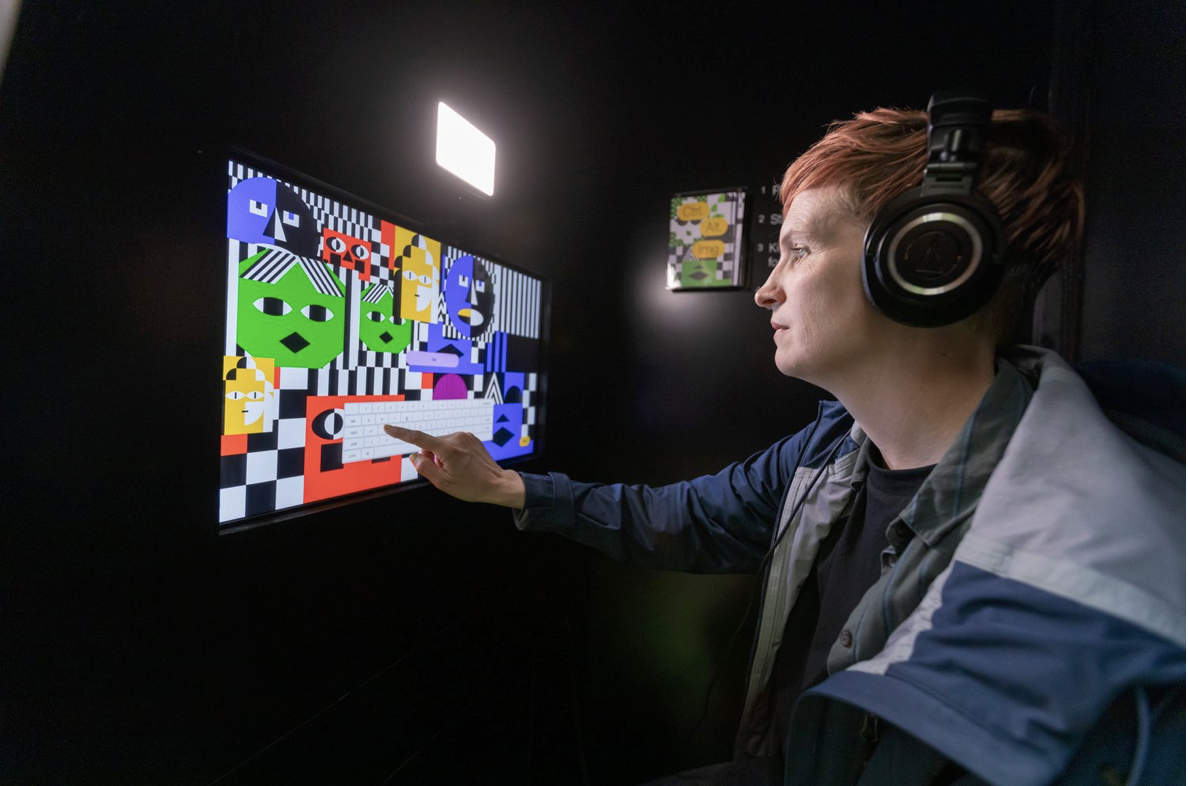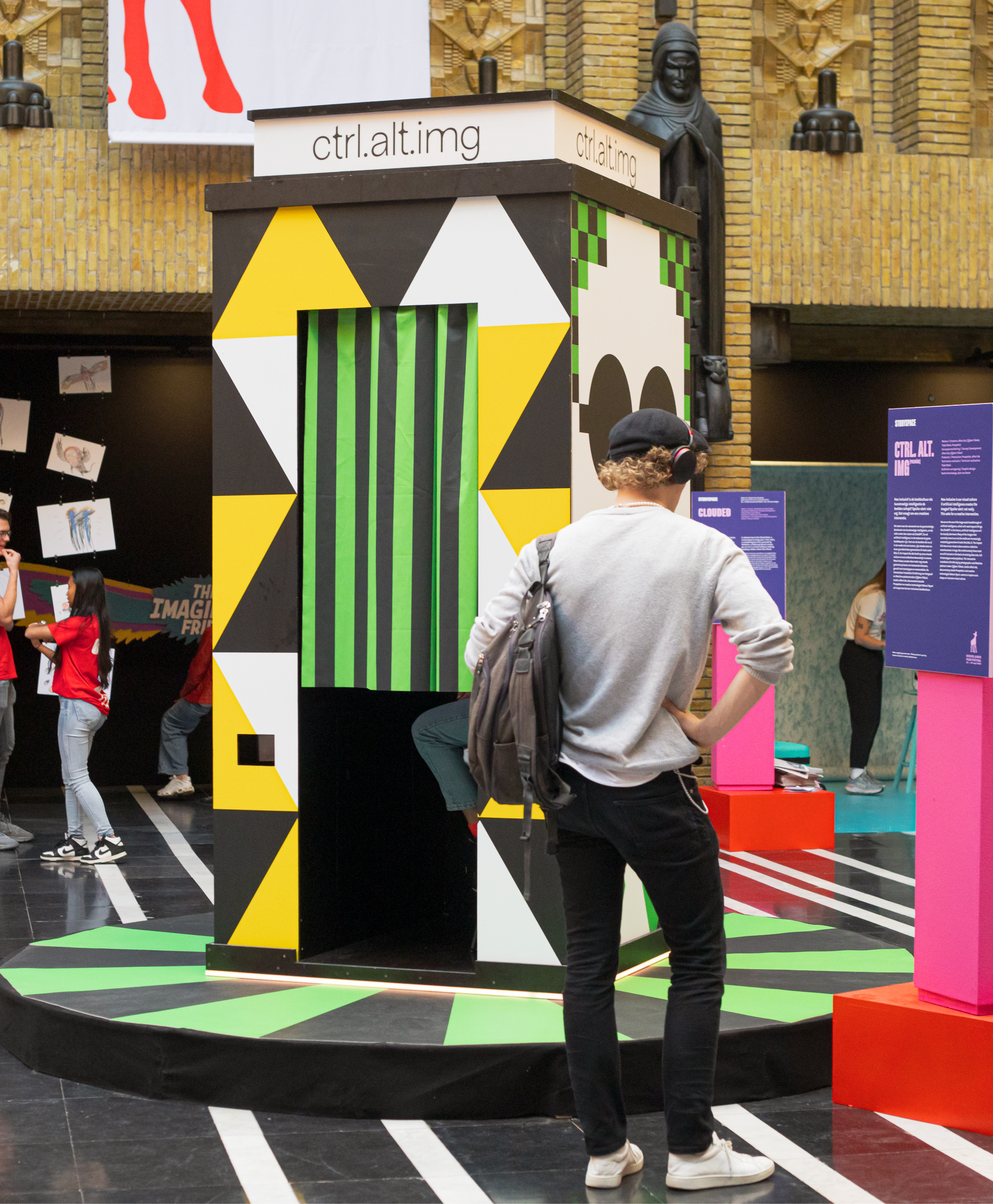CTRL.ALT.IMG
INSTALLATIONThe future is being visualised by artificial intelligence. Many of the images we see every day on social media and in the news are being created by algorithms and image-generation apps. Image banks, news outlets and social media companies are turning to technologies like Dall-E, Midjourney and Stable Diffusion to visualisethe world around us. This development has an enormous influence on visual culture and our collective consciousness, but what will the world look like through the eyes of AI? And will the average person on the street have any influence on the outcome?
Ctrl.Alt.Img was initiated by me an designed, researched and produced by affect lab in collaboration with Prospektor and creative technologist Babusi Nyoni (Triple Black). It was born out my research about the representation of muslim women in the Dutch media. I noticed that I didn’t recognise myself (or my mother or sister) in the photos often used in the media to represent muslim women. These images always seemed to share similar qualities: a veiled woman from behind, taken at a distance, often-times with a shopping bag in hand or at a market. Muslim women at work, doing sports or pictured in the context of education were rare. I asked: If new machine learning tools are being trained on existing datasets with the old social biases, then how can we future-proof AI images to be more inclusive?
Ctrl.Alt.Img is a creative intervention using existing AI tools like text-to-image apps to explore democratic approaches to image making.
Ctrl.Alt.Img is a interactive booth that mimics the form and dynamics of a playful photo booth. The booth invites participants to be photographed and analysed by AI while also presenting fleeting documentary footage. This footage offers a compelling first-hand account of how bias affects religious and ethnic-minority communities. Participants leave the booth with a digital photograph and an AI-generated image of themselves.
Ctrl.Alt.Img was initiated by me an designed, researched and produced by affect lab in collaboration with Prospektor and creative technologist Babusi Nyoni (Triple Black). It was born out my research about the representation of muslim women in the Dutch media. I noticed that I didn’t recognise myself (or my mother or sister) in the photos often used in the media to represent muslim women. These images always seemed to share similar qualities: a veiled woman from behind, taken at a distance, often-times with a shopping bag in hand or at a market. Muslim women at work, doing sports or pictured in the context of education were rare. I asked: If new machine learning tools are being trained on existing datasets with the old social biases, then how can we future-proof AI images to be more inclusive?
Ctrl.Alt.Img is a creative intervention using existing AI tools like text-to-image apps to explore democratic approaches to image making.
Ctrl.Alt.Img is a interactive booth that mimics the form and dynamics of a playful photo booth. The booth invites participants to be photographed and analysed by AI while also presenting fleeting documentary footage. This footage offers a compelling first-hand account of how bias affects religious and ethnic-minority communities. Participants leave the booth with a digital photograph and an AI-generated image of themselves.




Credits:
Ctrl.Alt.Img was initiated by photographer Çiğdem Yüksel
designed, researched and produced by affect lab in collaboration with Prospektor and creative technologist Babusi Nyoni (Triple Black).
Graphic design by Sasha Fominskaya
Installation design by Studio Stam
Special thanks to our documentary participants: Thomas Roebers; Oumaima Hajri; Tanguy Lebreton; Zahra Ahmadi; Mohamed Bah; Melike Tarim and Ramsay Drover.
Supported by Creative Industries Fund NL and MediaFutures.
Ctrl.Alt.Img was initiated by photographer Çiğdem Yüksel
designed, researched and produced by affect lab in collaboration with Prospektor and creative technologist Babusi Nyoni (Triple Black).
Graphic design by Sasha Fominskaya
Installation design by Studio Stam
Special thanks to our documentary participants: Thomas Roebers; Oumaima Hajri; Tanguy Lebreton; Zahra Ahmadi; Mohamed Bah; Melike Tarim and Ramsay Drover.
Supported by Creative Industries Fund NL and MediaFutures.

CTRL.ALT.IMG
INSTALLATIONThe future is being visualised by artificial intelligence. Many of the images we see every day on social media and in the news are being created by algorithms and image-generation apps. Image banks, news outlets and social media companies are turning to technologies like Dall-E, Midjourney and Stable Diffusion to visualisethe world around us. This development has an enormous influence on visual culture and our collective consciousness, but what will the world look like through the eyes of AI? And will the average person on the street have any influence on the outcome?
Ctrl.Alt.Img was initiated by me an designed, researched and produced by affect lab in collaboration with Prospektor and creative technologist Babusi Nyoni (Triple Black). It was born out my research about the representation of muslim women in the Dutch media. I noticed that I didn’t recognise myself (or my mother or sister) in the photos often used in the media to represent muslim women. These images always seemed to share similar qualities: a veiled woman from behind, taken at a distance, often-times with a shopping bag in hand or at a market. Muslim women at work, doing sports or pictured in the context of education were rare. I asked: If new machine learning tools are being trained on existing datasets with the old social biases, then how can we future-proof AI images to be more inclusive?
Ctrl.Alt.Img is a creative intervention using existing AI tools like text-to-image apps to explore democratic approaches to image making.
Ctrl.Alt.Img is a interactive booth that mimics the form and dynamics of a playful photo booth. The booth invites participants to be photographed and analysed by AI while also presenting fleeting documentary footage. This footage offers a compelling first-hand account of how bias affects religious and ethnic-minority communities. Participants leave the booth with a digital photograph and an AI-generated image of themselves.
Ctrl.Alt.Img was initiated by me an designed, researched and produced by affect lab in collaboration with Prospektor and creative technologist Babusi Nyoni (Triple Black). It was born out my research about the representation of muslim women in the Dutch media. I noticed that I didn’t recognise myself (or my mother or sister) in the photos often used in the media to represent muslim women. These images always seemed to share similar qualities: a veiled woman from behind, taken at a distance, often-times with a shopping bag in hand or at a market. Muslim women at work, doing sports or pictured in the context of education were rare. I asked: If new machine learning tools are being trained on existing datasets with the old social biases, then how can we future-proof AI images to be more inclusive?
Ctrl.Alt.Img is a creative intervention using existing AI tools like text-to-image apps to explore democratic approaches to image making.
Ctrl.Alt.Img is a interactive booth that mimics the form and dynamics of a playful photo booth. The booth invites participants to be photographed and analysed by AI while also presenting fleeting documentary footage. This footage offers a compelling first-hand account of how bias affects religious and ethnic-minority communities. Participants leave the booth with a digital photograph and an AI-generated image of themselves.




Credits:
Ctrl.Alt.Img was initiated by photographer Çiğdem Yüksel
designed, researched and produced by affect lab in collaboration with Prospektor and creative technologist Babusi Nyoni (Triple Black).
Graphic design by Sasha Fominskaya
Installation design by Studio Stam
Special thanks to our documentary participants: Thomas Roebers; Oumaima Hajri; Tanguy Lebreton; Zahra Ahmadi; Mohamed Bah; Melike Tarim and Ramsay Drover.
Supported by Creative Industries Fund NL and MediaFutures.
designed, researched and produced by affect lab in collaboration with Prospektor and creative technologist Babusi Nyoni (Triple Black).
Graphic design by Sasha Fominskaya
Installation design by Studio Stam
Special thanks to our documentary participants: Thomas Roebers; Oumaima Hajri; Tanguy Lebreton; Zahra Ahmadi; Mohamed Bah; Melike Tarim and Ramsay Drover.
Supported by Creative Industries Fund NL and MediaFutures.